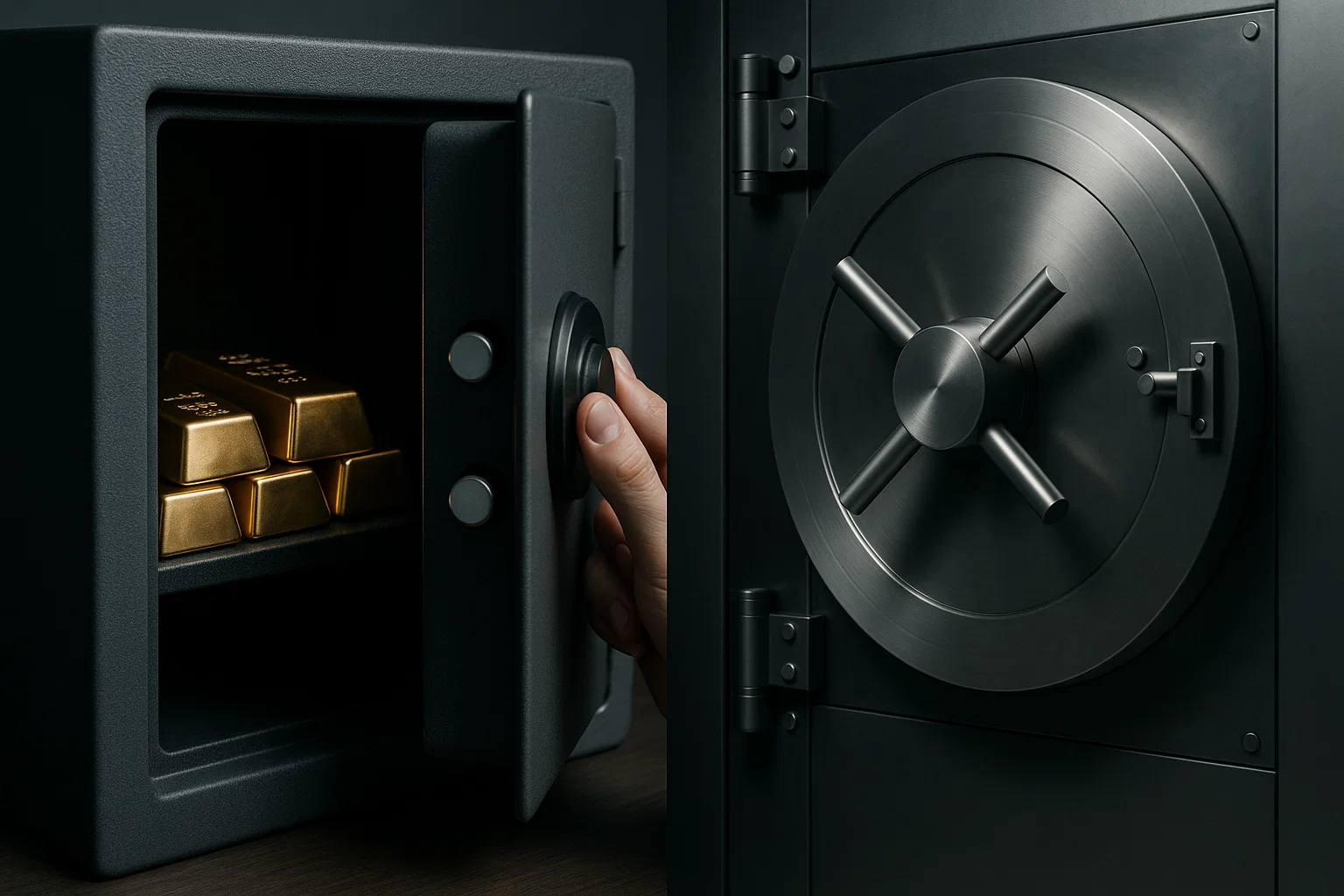Buying precious metals is smart. Storing it? That’s where smart gets strategic.
Once you own physical gold—whether bars or coins—you’re holding real, tangible wealth. But like any valuable, where and how you store it matters.
Here’s what you need to know about home vs. vault storage so your gold stays protected, liquid, and ready when you need it.
🏠 Option 1: Storing Gold at Home
The upside? Total control.
You can see it, touch it, and access it anytime. Many beginners start here—especially for smaller quantities (under $10k–$20k worth).
Best practices for storing at home:
- Invest in a high-quality fireproof safe, ideally bolted to the floor
- Keep your gold in original packaging (assay, capsules, sleeves)
- Store it in a discreet location—not your nightstand
- Consider a hidden-in-plain-sight safe or decoy options
Security tips:
- Don’t advertise your collection
- Limit who knows you store gold at home
- Add home insurance coverage for valuables
💡 Pro Tip: Label your storage generically (“documents” or “tools”) to deflect attention.
🏢 Option 2: Vault or Depository Storage
The upside? Maximum security.
Third-party vaults or depositories specialize in storing high-value assets like gold. Many are fully insured and independently audited.
Benefits of professional storage:
- Secure, climate-controlled, and monitored 24/7
- Insurance often included (check policy details)
- Many allow easy resale, trade, or IRA rollover
- Keeps your assets offsite (ideal for disaster planning)
Downsides:
- You may not access your gold instantly
- Storage fees apply (usually low, % of value annually)
💡 For large holdings or IRA gold, vault storage is often required.
💡 IRS IRA Guidelines on Precious Metals
How Do You Choose?
Start with questions like:
- How much gold do I own?
- Do I plan to access it regularly?
- Am I worried about theft, fire, or natural disasters?
- Do I want it in a trust or for legacy planning?
Coins Online’s Take
We believe in putting the power in your hands. Our goal is to provide you with the right education to let you come to the best decision for you and where you are in your collecting. We are not advisors, rather a top trusted resource that has been in the business for over 36 years. We believe in no pressure, just options.
Key Takeaways on Storing Physical Gold
- Home storage offers privacy and immediate access when you use a proper safe and maintain discretion.
- Vault storage delivers professional security and insurance for larger or long-term holdings.
- Many collectors use a blended approach for flexibility and peace of mind.
- Whatever you choose, include storage in your legacy planning and keep documentation organized.
Collector’s Checklist for Gold Storage
- Use a fire-rated, burglary-rated safe at home; anchor it and store it discreetly.
- Confirm insurance coverage and access policies with any vault provider.
- Keep receipts, serial numbers, and certificates together for quick verification.
- Limit disclosure of storage details to trusted family members only.
- Document how to access your metals for heirs or executors.
Further Reading for Gold Collectors
- How to Spot Fake Gold Bars: Visual + Weight Tests
- What Is an Assay Certificate and Why It Matters
- How to Buy Physical Gold: A Complete Beginner’s Guide
- Gold Coins vs. Gold Bars: What’s Better for Beginners?
Collector Confidence with Coins Online
Every gold product offered by Coins Online is hand-vetted for authenticity, weight, and purity, and our Freedom & Authenticity Guarantees reflect a commitment to clarity over hype. Learn more about our values and approach on our About page:
About Coins Online
Considering Professional Storage?
If you’d like secure, insured vaulting with clear policies, explore Coins Online Bullion Services:
Coins Online Bullion Services
Frequently Asked Questions About Storing Physical Gold
Is it safer to store gold at home or in a vault?
Both options can be secure if handled correctly. Home storage offers direct access and privacy, while professional vault storage provides institutional-level security and insurance. Many collectors use a combination of both for flexibility and peace of mind.
What type of safe should I use for storing gold at home?
A fireproof and burglary-rated safe, securely anchored, is recommended for home storage. Choose one large enough to accommodate future collecting while remaining discreet in placement.
Do vaults provide insurance for stored gold?
Yes, reputable vault providers typically include insurance coverage against theft, loss, or damage. It is important to confirm the policy terms and limits with your chosen facility before storage.
Can I access my gold anytime if it is stored in a vault?
Access policies vary by provider. Some allow same-day appointments, while others require advance notice. Vault storage prioritizes security, so immediate walk-in access is rarely available.
What is the best way to keep gold discreet at home?
Discretion comes from both physical placement and who you share details with. Avoid obvious hiding spots, limit disclosure to trusted individuals, and consider diversifying storage across more than one location.
Does storing gold in a safe deposit box count as vault storage?
Safe deposit boxes at banks provide a layer of protection, but they differ from private vaults. Banks typically do not insure contents, and access is limited to banking hours. Private vaults offer extended services tailored to precious metals.


Leave a Reply